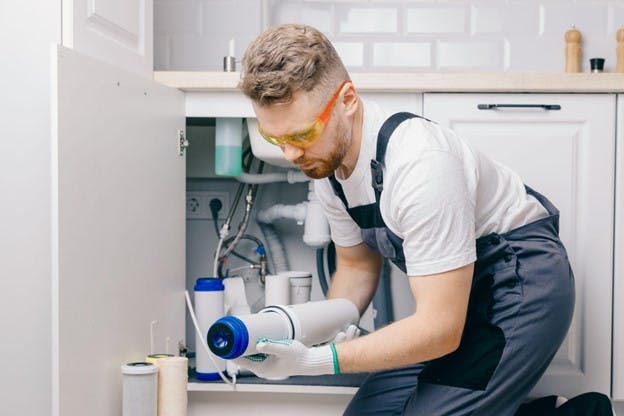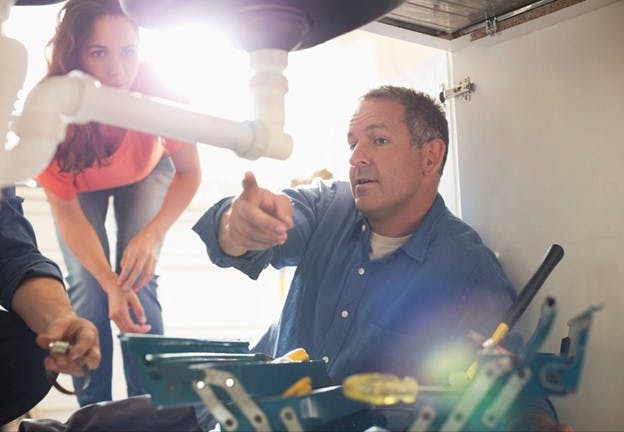🌟 New Arrival! Upgrade Your Water with Our Advanced Pitcher Filter. Shop Now
December 2023
The Ultimate Guide to Water Filter Maintenance
The use of home water filters is on the rise in American and Canadian households. As more people become health conscious, we’re not only increasing our water intake, we’re also paying more attention to our drinking water quality. Water filters reduce contaminants, making our tap water safer and better tasting. But if you want them to keep working, they need regular maintenance.
The maintenance required can vary greatly. Depending on the type and brand of water filter you own, maintaining them can be low-fuss and budget-friendly (like HomeWater filters), or it could require a plumber and a larger financial investment.
In this article, we’re going to dive deep into water filter maintenance for various types of water filters. We’ll tell you how to maintain them, why it's so important, and give you a good idea of how often you should be doing it.
Why Do Water Filters Need Maintenance?
Regular water filter maintenance isn’t just a recommendation. It’s absolutely necessary if you want to keep your water safe and clean. A well-maintained water filtration system will remove all sorts of impurities from your drinking water, but when neglected, they can introduce new problems. Here are some of the reasons regular and proper water filter maintenance is a must.
Effectiveness Over Time
Water filters are designed to remove impurities from your tap water. However, as time passes, the filter cartridges can clog up and become less effective. Without regular maintenance, you might find that your filter isn’t protecting your faucet as well as it used to, potentially allowing unwanted substances to make their way into your glass. If your filter isn’t performing at its peak, you could be exposed to a range of waterborne contaminants from bacteria to heavy metals.
Quality of Your Water
As the effectiveness of your water filter system declines, you may find yourself less likely to reach for another glass. Contaminants like chlorine, bacteria, and metals start making their way past your filters, and the taste and smell of your water will reflect it. As your water quality gets worse, it could discourage you and your family from staying properly hydrated without even realizing it.
Longevity of Your Filter
If you want something to last a long time, it needs to be well-maintained. Proper maintenance can significantly extend the lifespan of your water filter. While it may be a little bit of work, regular upkeep is a cost-effective way to make sure that you get the most out of your investment.
Water Pressure
Your water pressure is important to you. That’s why HomeWater filters are designed so you don’t have to sacrifice your flow rate in order to get clean water. However, if you don’t keep up with regular maintenance tasks like filter changes, debris can build up and you could lose some of that coveted pressure.
Safety of Your Water
Water filter systems that aren't maintained can breed bacteria and mold. The filter materials can also break down and end up in your water supply. Performing the recommended water filter maintenance ensures you keep getting clean water from your tap.
How Do You Maintain a Water Filter?
Maintaining a water filter doesn't have to be a daunting task. With a few simple steps and regular checks, you can ensure that your water filter remains effective for years to come. Here's how to go about it, based on the type of water filter you own.
Activated Carbon Filters
Activated carbon filters are some of the most common filters on the market. They work by attracting and adsorbing contaminants like chlorine and organic compounds onto their large surface area.
How to Maintain an Activated Carbon Filter
Check for clogs: Reduced water flow may indicate a clog. Replace the cartridge if needed.
Regularly replace water fIlter cartridges: As hundreds or even thousands of gallons of water pass through the filter, its effective surface area will become saturated until you need new filter cartridges.
Sanitize: If recommended by the manufacturer, periodically use a sanitizing solution as indicated by your filter’s guidelines to keep bacterial growth at bay.
How Often Should You Replace Activated Carbon Filter Cartridges?
Typically replacements should be every three to six months. However, you always want to check the manufacturer's guidelines for how often the cartridges should be replaced.
The amount of time between changes will depend on many factors, including the size of the filter, whether there are pre-filters to capture larger debris, the types and amounts of contaminants being filtered, how much contact time the filter has with water, and how many gallons of water have passed through it.
Reverse Osmosis Systems
Reverse osmosis (RO) systems work by pushing water through tiny holes in a reverse osmosis membrane. The holes are so small that they only allow the water molecules through. This makes them highly effective filters for even very small microorganisms like viruses, which can slip through other filters. This does mean it can take a while to push a meaningful amount of water through the membrane. So you’re not waiting when you turn on your tap, RO systems come with a storage tank that holds filtered water so it’s there when you need it.
How to Maintain a Reverse Osmosis Filtration System
Check your pre-filters: Because RO membranes can be delicate and become clogged, these systems often come with pre-filters, sediment filters, and water polishers which need to be checked on from time to time and replaced on schedule.
System flush: Periodically, run a system flush to clear out buildup in the membrane if your RO system doesn’t do this automatically.
Regular cleaning: Every few weeks, it’s a good idea to clean out the water storage tank. Especially if it’s installed in a sink you don’t use often.
How Often Should You Replace a Reverse Osmosis Membrane?
Usually the RO membrane should be replaced every 24 months, but check your model's guidelines. If you have them, the sediment pre-filter, pre-carbon filter, and post-carbon filter should be replaced every six to 12 months or sooner depending on usage.
Ultraviolet Light Filters
UV disinfection systems use ultraviolet light waves to deactivate the DNA of microbial contaminants like protozoan, cysts, and viruses. UV light filters are generally part of a multistage system when used in home filtration systems and they are favored because they don’t add chemicals to your glass.
How to Maintain a UV Light Filter
Keep it clean: Because this system uses light, it's important that the quartz sleeve that light passes through is clean. For many systems this means giving it some care every few months for optimal UV transmission.
Check electrical connections: Make sure all electrical components are dry and securely connected, especially if you’ve had to do any work in the area.
How Often Should You Replace a UV Lamp?
For optimal disinfection performance, it’s recommended that you replace the lamp once per year.
Whole Home Systems
Whole house water treatment systems are designed to filter all the water that comes into your home, providing clean, safe water at every tap. These systems often combine multiple filtration methods, such as activated carbon and sediment filters, to ensure complete water treatment.
How to Maintain a Whole Home Water FIltration System
Check for clogs: Reduced water flow in multiple areas of the house may indicate a clog in the system. Check and replace cartridges or filter media as needed.
System check: Periodically inspect the entire system, including any gauges or meters that could indicate issues. Ensure all connections are secure and there are no leaks.
Professional inspection: Due to their complex nature, it’s often advisable to have a professional perform an annual inspection and any needed maintenance tasks, like changing out large filter media or inspecting UV sterilizers if your system includes these components.
In contrast, HomeWater's UPSTREAM™ 4-Stage Whole Home Water Filter is engineered for ease and longevity. Thanks to features like automatic media backwashing and quick-change pre-filters, this system minimizes the hassle all the way around.
How Often Should You Replace Filters in a Whole House System?
There are many components involved in a whole house system. The intervals for replacing them will depend on factors like the quality of your incoming water, how much water is used, and the specific filters or treatments your system includes. Consult your manufacturer's guidelines for the most accurate information.
- Sediment pre-filters: Usually, these need to be changed every 3 to 6 months, depending on the sediment levels in your water.
- Specialized filters: These could be for removing specific contaminants like iron or chloramines. Check the manufacturer’s guidelines for replacement intervals.
- System media: This includes large media beds or tanks that may consist of multiple filtering materials like granular activated carbon (GAC), red flint, and KDF55. These generally require replacement or re-bedding every 3 to 5 years, depending on the system and the water quality that passes through it.
How Often Should a Water Filter Be Serviced?
While a little preventative maintenance can go a long way, if you have a very complex whole house system, it’s a good idea to have it inspected annually to make sure there are no leaks or other problems. If you have very hard water that clogs up your pipes, you may need to have it serviced more often or have a water softener system installed.
What Are General Tips for Water Filtration System Maintenance?
It’s always a good idea to be on the lookout for leaks and clogs. If you notice a difference in your water pressure or the quality of your water, take a few minutes to inspect the system. Do a visual inspection for leaks, mold, or any signs of wear and tear. If you haven’t run water through the filter in a few days, run the tap for a few minutes before you take a drink.
Finally, make sure to read your owner’s manual and set reminders in your calendar for maintenance. Following the recommended timeline for preventative maintenance will ensure you have healthy water coming from your tap for years to come.
Water Filter Maintenance Can Be Easy and Affordable
When you consider the benefits of having a high–quality water filtration system in your home,
Some occasional water filter maintenance shouldn’t be a deterrent. However, we understand our customers are busy. That’s why we design all of our American-made water filtration systems with maintenance in mind. With top-loading designs that prevent spills and pre-filters that can be changed in as little as 20 seconds, we make it easy for you to get the job done and get on with your life.
If you want the best-tasting water without all the fuss, HomeWater can help. Our HomeWater EZChange 2-Stage Under Counter Under Sink Water Filter installs in just 15 minutes under any sink. It uses your existing faucet line and doesn’t cut into your countertop. Our patented EZChange system means you can replace the filter cartridges fast.
The 2-stage system removes chlorine, lead, rust, dirt, particulate matter, and improves taste and odor. And no tank or additional faucet is required! So if you want the most delicious, clean water imaginable without the grind, give HomeWater a try today.


